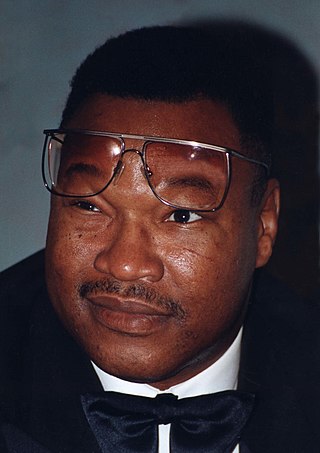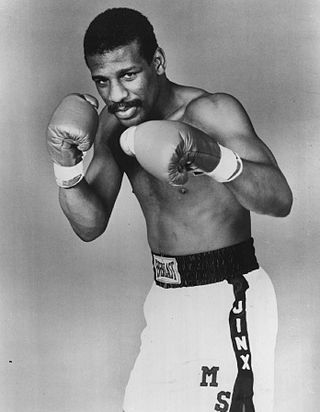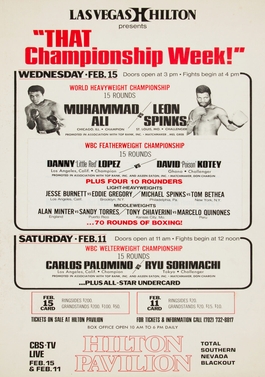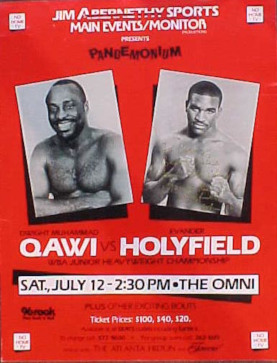
Larry Holmes is an American former professional boxer who competed from 1973 to 2002 and was world heavyweight champion from 1978 until 1985. He is often considered to be one of the greatest heavyweight boxers of all time. He grew up in Easton, Pennsylvania, which led to his boxing nickname of the "Easton Assassin".

Osvaldo "Ossie" Ocasio is a Puerto Rican former boxer who held the World Cruiserweight Championship from 1982 to 1984. He was also a Top Contender and Heavyweight Challenger in 1979. He scored notable wins against Former Cruiserweight Champion Dwight Muhammad Qawi as well as beating Top Heavyweight Contender Jimmy Young and Heavyweight Contender Pierre Coetzer, as well as drawing with Future Heavyweight Champion Michael Dokes. Nicknamed "Jaws", his peculiar nickname was the result of him accidentally biting another boxer during a sparring session.

Michael Spinks is an American former professional boxer who competed from 1977 to 1988. He held world championships in two weight classes, including the undisputed light heavyweight title from 1983 to 1985, and the lineal heavyweight title from 1985 to 1988. As an amateur he won a gold medal in the middleweight division at the 1976 Summer Olympics.

Evander Holyfield is an American former professional boxer who competed between 1984 and 2011. He reigned as the undisputed champion at cruiserweight in the late 1980s and at heavyweight in the early 1990s, and was the only boxer in history to win the undisputed championship in two weight classes in the "three belt era", a feat later surpassed by Terence Crawford, Naoya Inoue and Oleksandr Usyk, who became two-weight undisputed champions in the four-belt era. Nicknamed "the Real Deal", Holyfield is the only four-time world heavyweight champion, having held the unified WBA, WBC, and IBF titles from 1990 to 1992, the WBA and IBF titles again from 1993 to 1994, the WBA title a third time from 1996 to 1999; the IBF title a third time from 1997 to 1999 and the WBA title for a fourth time from 2000 to 2001.

Leon Spinks was an American professional boxer who competed from 1977 to 1995. In only his eighth professional fight, he won the undisputed heavyweight championship in 1978 after defeating Muhammad Ali in a split decision, in what is considered one of the biggest upsets in boxing history. Spinks was later stripped of the WBC title for facing Ali in an unapproved rematch seven months later, which he lost by a unanimous decision.
Matthew Saad Muhammad was an American professional boxer who was the WBC Light Heavyweight Champion of the World for two-and-a-half years.

Mike Rossman is an American former professional boxer who was the WBA light heavyweight champion of the world. He is of both Italian and Jewish descent, which led to his monikers "The Kosher Butcher" and "The Jewish Bomber".

Boxing in the 1980s was filled with important fights, events and personalities that shaped the sport. Boxing in the 1980s was shaped by many different situations, such as the continuous corporate battles between the different world sanctioning organizations, the void left by Muhammad Ali as the sport's ambassador and consequent search for a new boxing hero, the continuous presence of Don King as the sport's most famous promoter, the surge of rival promoters as Bob Arum, Butch Lewis and Murad Muhammad, and major rule changes. In 1986, Mike Tyson emerged as a fresh new face in the heavyweight division, which had seen a decline in champion quality level after Ali's retirement and, later on, after longtime WBC ruler Larry Holmes' prime. In addition, the IBF and WBO began operating.
During the 1970s, boxing was characterized by dominating champions and history-making rivalries. The decade had many superstars, who also had fierce rivals. Alexis Argüello, for example, who won the world Featherweight and Jr. Lightweight titles in the '70s, had to overcome Alfredo Escalera twice before the decade was over.
During the 1960s, boxing, like mostly everything else around the world, went through changing times. Notable was the emergence of a young boxer named Cassius Clay, who would, in his own words shock the world, declare himself against war, and change his name to Muhammad Ali.
Dwight Muhammad Qawi is an American former professional boxer who competed from 1978 to 1998. He was a world champion in two weight classes, having held the WBC and Ring magazine light heavyweight titles from 1981 to 1983, and the WBA cruiserweight title from 1985 to 1986. Qawi was inducted into the International Boxing Hall of Fame in 2004.

Mike Tyson vs. Michael Spinks, billed as Once and For All, was a professional boxing match which took place on June 27, 1988. Both fighters were undefeated and each had a claim to being the legitimate heavyweight champion. At the time, Tyson held the belts of all three of the major sanctioning organizations while Spinks was The Ring and Lineal champion. The fight was held at the Convention Hall, Atlantic City, New Jersey U.S., it was at the time the richest fight in boxing history, grossing some $70 million, of which Tyson earned a record purse of around $22 million and Spinks $13.5 million. Tyson won the fight, knocking out Spinks in 91 seconds.

Nikolai Valuev vs. Evander Holyfield was a professional boxing match contested on 20 December 2008 for the WBA heavyweight championship.

Muhammad Ali vs. Leon Spinks was a professional boxing match contested on February 15, 1978, in Las Vegas, Nevada, for the WBA, WBC, and The Ring heavyweight championship.

Leon Spinks vs. Muhammad Ali II, billed as Battle of New Orleans, was a professional boxing match contested on September 15, 1978, in New Orleans for the WBA and The Ring heavyweight championships.

Dwight Muhammad Qawi vs. Evander Holyfield, billed as "Pandemonium" was a professional boxing match contested on July 12, 1986 for the WBA Junior Heavyweight championship.

Evander Holyfield vs. Ossie Ocasio was a professional boxing match contested on 15 August 1987 for the WBA and IBF cruiserweight title.
Evander Holyfield vs. Dwight Muhammad Qawi II was a professional boxing match contested on December 5, 1987 for the WBA and IBF cruiserweight titles.
The second fight between Tim Witherspoon and James "Bonecrusher" Smith was contested on December 12, 1986. The bout took place at Madison Square Garden in New York City and was contested for Witherspoon's WBA heavyweight championship. It was Witherspoon’s second defence of the championship he had won from Tony Tubbs in January 1986.
Larry Hazzard Sr. is a former amateur boxer, boxing referee, athletic control board commissioner, teacher and actor. He is a member of the International Boxing Hall of Fame, being inducted during 2010. Hazzard has served as Commissioner of the New Jersey State Athletic Control Board since 2014, his second stint as commissioner after serving from 1985 to 2007.













